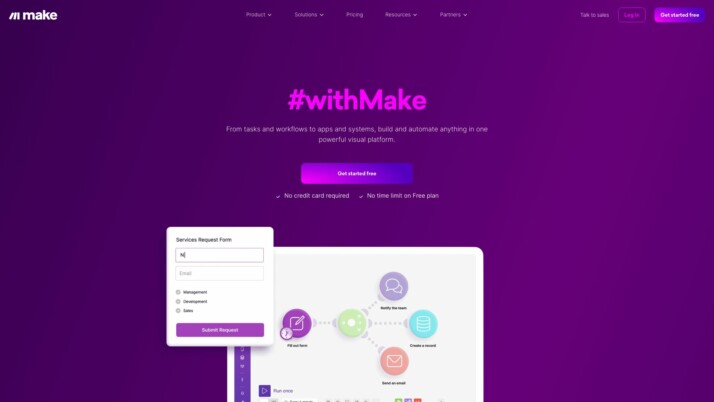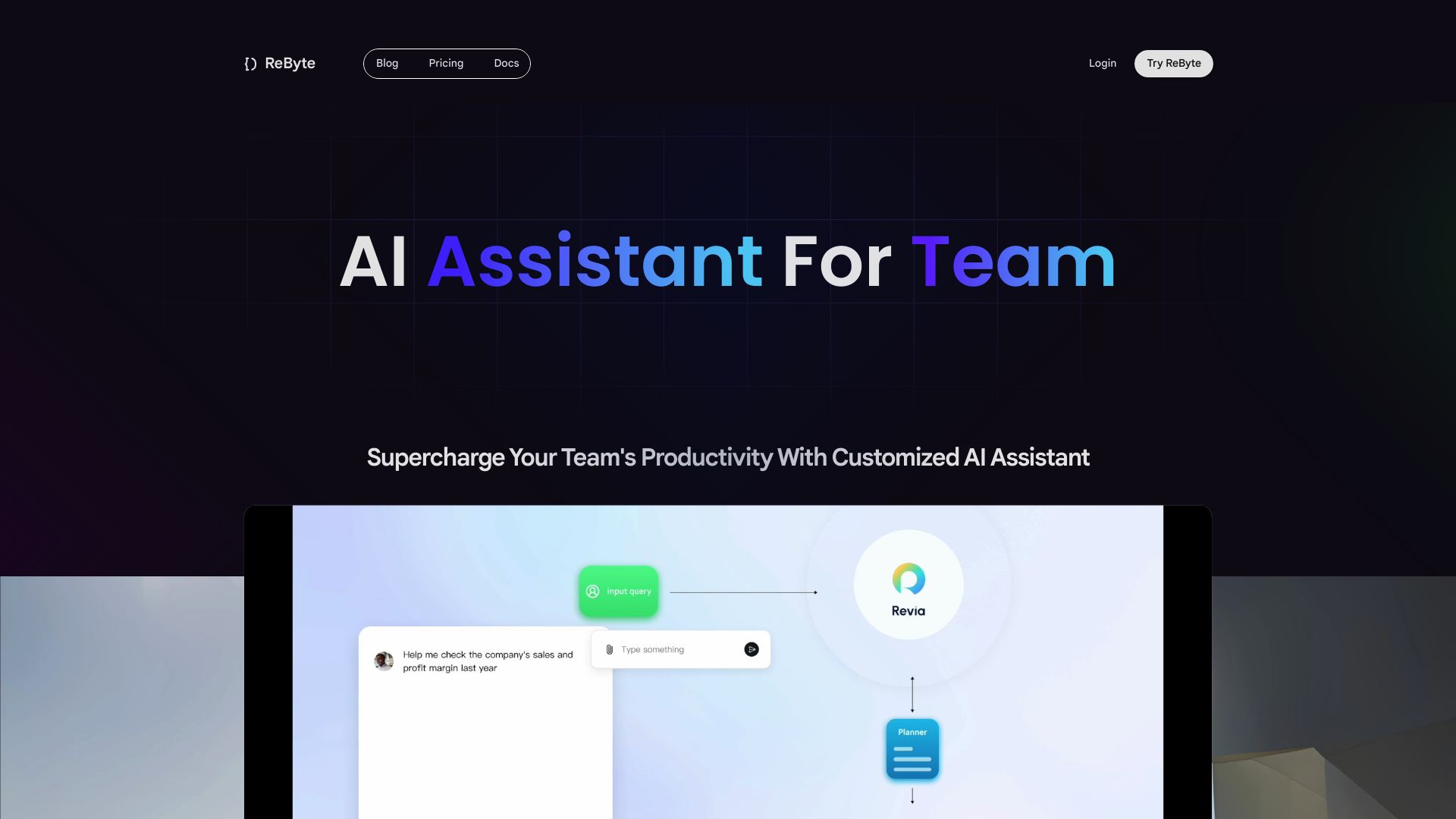Make.com vs. Rebyte: AI Automation Showdown
AI-powered automation platforms are transforming how businesses operate, enabling rapid development of sophisticated workflows and applications. This comparison explores Make.com’s robust workflow automation capabilities and Rebyte’s innovative AI agent development platform. We’ll examine how these tools empower users to create complex integrations and AI-driven solutions, highlighting their strengths and limitations.
For readers seeking to harness AI’s full potential in their workflows, we’ll also introduce SmythOS, a comprehensive platform that combines advanced AI features with user-friendly development tools. Whether you’re a developer, business leader, or AI enthusiast, this review will help you navigate the evolving landscape of AI automation platforms and choose the solution that best fits your needs.
Make.com Overview
Make.com provides a visual no-code platform for automating workflows and integrating apps without coding. Users build scenarios by connecting tasks and data flows between over 1000 popular services and APIs.


The drag-and-drop interface allows rapid creation of complex workflows. Pre-built templates accelerate development for common use cases like lead management, order processing, and social media automation. Make.com handles scheduling, error handling, and data transformations to streamline business processes.
Make.com provides a visual no-code platform for automating workflows and integrating apps without coding. Users build scenarios by connecting tasks and data flows between over 1000 popular services and APIs.
While Make.com excels at workflow automation, it lacks some advanced AI capabilities. The platform doesn’t offer hosted AI agents, autonomous agents, or specialized AI features like memory and context. However, its robust integration options allow connecting to external AI services when needed.
Make.com shines in areas like scalability, collaboration features, and detailed execution logs for troubleshooting. The platform supports team-based workflows with roles and permissions. Enterprise-grade security, including OAuth and data encryption, makes it suitable for business-critical processes.
Overall, Make.com provides an accessible yet powerful platform for workflow automation across business systems. While not an AI-first solution, its visual builder and extensive integrations enable rapid development of sophisticated automated processes.
Rebyte Overview
Rebyte empowers users to create AI-powered applications without extensive coding skills. The platform’s visual agent builder allows for the development of complex AI agents using large language models, complete with customizable user interfaces. Rebyte handles the entire lifecycle of AI applications, from creation to deployment, with minimal manual coding required.
The platform excels in providing a no-code environment for building sophisticated AI agents. Users can design multi-step processes, integrate with private data sources, and deploy fully customized AI solutions. Rebyte’s serverless runtime ensures smooth production deployment and scaling of agents, making it an attractive option for businesses looking to implement AI solutions quickly.
Rebyte’s focus on democratizing AI development sets it apart in the market. The platform aims to empower knowledge workers and teams to automate workflows and boost productivity through intuitive, no-code interfaces. This approach makes AI technology accessible to a broader audience, including non-technical professionals who can now leverage AI to solve complex business problems.
Rebyte empowers users to create AI-powered applications without extensive coding skills. The platform’s visual agent builder allows for the development of complex AI agents… with minimal manual coding required.


While Rebyte offers powerful capabilities, it may have limitations compared to more established platforms. The lack of explicit environments for development and production could pose challenges for teams requiring strict separation between testing and live deployments. Additionally, the platform’s newness in the market means its ecosystem and community support may not be as extensive as those of more mature competitors.
Integration capabilities are a strong point for Rebyte, allowing connections to various data sources and systems. However, the platform’s documentation doesn’t explicitly mention support for popular AI models or APIs like Hugging Face or Zapier, which could limit options for users seeking specific integrations. Despite these potential drawbacks, Rebyte’s innovative approach to AI agent development makes it a compelling choice for organizations looking to rapidly prototype and deploy AI solutions without deep technical expertise.
Feature Comparison
Make.com and Rebyte offer visual workflow builders for automating tasks, but differ significantly in their AI capabilities and deployment options. Make.com excels in workflow automation with over 1000 app integrations and robust scheduling features. However, it lacks advanced AI capabilities like hosted agents or autonomous agents. Rebyte focuses more on AI-powered applications, allowing users to create customized AI agents using large language models, but has less extensive integration options compared to Make.com.
Make.com’s strength lies in its extensive third-party integrations and detailed execution logs, making it ideal for complex business process automation. It supports team collaboration, OAuth authentication, and API deployment. In contrast, Rebyte specializes in AI agent development with features like a visual agent builder and customizable user interfaces. Rebyte’s serverless runtime facilitates easy production deployment and scaling of AI agents, catering to users looking to rapidly prototype and deploy AI solutions without deep technical expertise.
Both platforms have gaps in certain areas. Neither offers explicit development and production environments or advanced AI features like foundation models or Hugging Face integrations. Make.com lacks AI-specific features like memory and context for agents, while Rebyte’s integration capabilities and community support may be less extensive due to its newer market presence. For users seeking comprehensive AI agent development with advanced features like hosted agents, multi-agent collaboration, and extensive AI model support, a more specialized platform like SmythOS might be a better fit.
Feature Comparison Table
| Make.com | Rebyte | SmythOS | |
|---|---|---|---|
| CORE FEATURES | |||
| AI Agents | ❌ | ✅ | ✅ |
| Hosted Agents (Dev, Production) | ❌ | ✅ | ✅ |
| Environments (Dev, Production) | ❌ | ✅ | ✅ |
| Memory & Context | ❌ | ✅ | ✅ |
| Autonomous Agents | ❌ | ❌ | ✅ |
| Explainability & Transparency | ❌ | ✅ | ✅ |
| Multimodal | ❌ | ❌ | ✅ |
| Problem-Solving Capabilities | ❌ | ✅ | ✅ |
| Multi-Agent Collaboration | ❌ | ❌ | ✅ |
| Human-AI Interaction | ❌ | ✅ | ✅ |
| SECURITY | |||
| Constrained Alignment | ❌ | ❌ | ✅ |
| Data Encryption | ❌ | ❌ | ✅ |
| OAuth | ✅ | ❌ | ✅ |
| IP Control | ❌ | ❌ | ✅ |
| COMPONENTS | |||
| Foundation AIs | ❌ | ✅ | ✅ |
| Huggingface AIs | ❌ | ❌ | ✅ |
| Zapier APIs | ❌ | ✅ | ✅ |
| Classifiers | ❌ | ❌ | ✅ |
| Logic | ✅ | ❌ | ✅ |
| Data Lakes | ❌ | ❌ | ✅ |
| DEPLOYMENT OPTIONS (EMBODIMENTS) | |||
| Deploy as API | ❌ | ✅ | ✅ |
| Deploy as Webhook | ✅ | ❌ | ✅ |
| Staging Domains | ❌ | ❌ | ✅ |
| Production Domains | ❌ | ❌ | ✅ |
| API Authentication (OAuth + Key) | ✅ | ❌ | ✅ |
| Deploy as Site Chat | ❌ | ✅ | ✅ |
| Deploy as Scheduled Agent | ✅ | ❌ | ✅ |
| DATA LAKE SUPPORT | |||
| Hosted Vector Database | ❌ | ✅ | ✅ |
| Sitemap Crawler | ❌ | ❌ | ✅ |
| YouTube Transcript Crawler | ❌ | ❌ | ✅ |
| URL Crawler | ❌ | ❌ | ✅ |
| PDF Support | ❌ | ✅ | ✅ |
| Word File Support | ❌ | ✅ | ✅ |
| TXT File Support | ❌ | ✅ | ✅ |
Best Alternative to Make.com and Rebyte
SmythOS stands out as the superior alternative to Make.com and Rebyte for AI agent development and deployment. Our platform combines powerful AI capabilities with user-friendly design, offering a comprehensive solution that surpasses both competitors in key areas.
We provide a visual drag-and-drop interface that simplifies complex AI workflow creation. Unlike Make.com’s focus on general automation or Rebyte’s emphasis on custom AI applications, SmythOS delivers a complete ecosystem for AI agent development. Our platform supports hosted agents in both development and production environments, enabling seamless transitions from prototyping to full-scale deployment.
SmythOS delivers a complete ecosystem for AI agent development… enabling seamless transitions from prototyping to full-scale deployment.
SmythOS excels in its extensive feature set, addressing limitations found in Make.com and Rebyte. We offer advanced capabilities such as memory and context management, autonomous agents, and multi-agent collaboration. These features empower users to create sophisticated AI solutions that can handle complex tasks and adapt to various scenarios. Additionally, our platform supports a wide range of AI models, including integrations with Hugging Face and foundation models, providing flexibility and power that outpaces our competitors.
Our platform’s versatility sets it apart from Make.com and Rebyte. SmythOS supports multiple deployment options, including APIs, webhooks, chatbots, and scheduled agents. This flexibility allows users to integrate AI agents seamlessly into existing workflows and applications. Furthermore, our robust security features, including data encryption and OAuth support, ensure that AI deployments meet enterprise-grade standards — a critical consideration often overlooked by other platforms.
SmythOS supports multiple deployment options… This flexibility allows users to integrate AI agents seamlessly into existing workflows and applications.
By choosing SmythOS, users gain access to a comprehensive AI agent development platform that combines ease of use with powerful features. Our solution empowers businesses and developers to create, deploy, and manage AI agents efficiently, driving innovation and productivity across various industries. With SmythOS, the possibilities for AI integration and automation are virtually limitless, making it the clear choice for those seeking a superior alternative to Make.com and Rebyte.
Conclusion
Make.com and Rebyte each offer unique approaches to workflow automation and AI application development. Make.com excels in no-code workflow automation with its extensive app integrations and robust scheduling features. Rebyte focuses on AI-powered applications, allowing users to create customized AI agents using large language models. However, both platforms have limitations in advanced AI capabilities and development environments.
SmythOS emerges as the superior choice, combining the strengths of both platforms while addressing their limitations. We offer a comprehensive solution for AI agent development and deployment, featuring a user-friendly visual builder, extensive integrations, and advanced AI capabilities. Our platform supports hosted agents, multiple environments, and a wide range of deployment options, making it suitable for businesses of all sizes and technical expertise levels.
For those seeking to harness the full potential of AI in their workflows, we invite you to explore our diverse range of AI-powered agent templates and experience unlimited AI automation risk-free. With SmythOS, you can create once and deploy anywhere, revolutionizing your approach to AI integration and automation. Discover 300,000+ seamless integrations to supercharge your projects and transform your ideas into reality.
Last updated:
Disclaimer: The information presented in this article is for general informational purposes only and is provided as is. While we strive to keep the content up-to-date and accurate, we make no representations or warranties of any kind, express or implied, about the completeness, accuracy, reliability, suitability, or availability of the information contained in this article.
Any reliance you place on such information is strictly at your own risk. We reserve the right to make additions, deletions, or modifications to the contents of this article at any time without prior notice.
In no event will we be liable for any loss or damage including without limitation, indirect or consequential loss or damage, or any loss or damage whatsoever arising from loss of data, profits, or any other loss not specified herein arising out of, or in connection with, the use of this article.
Despite our best efforts, this article may contain oversights, errors, or omissions. If you notice any inaccuracies or have concerns about the content, please report them through our content feedback form. Your input helps us maintain the quality and reliability of our information.
